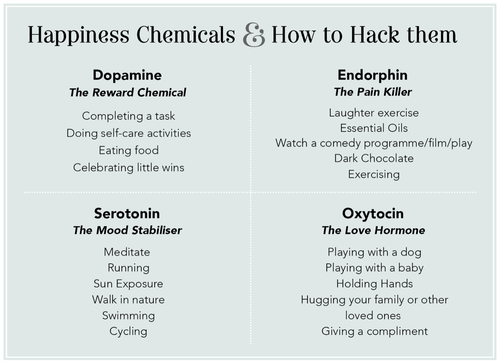Last Updated on September 16, 2022
The brain is a complex organ, and it regulates everything we do, including our mood. The chemicals produced by the brain are called neurotransmitters. Neurotransmitters carry signals from neuron to neuron, transmitting information to other cells, muscles, and glands. Happiness is dependent on these chemicals. But what can you do to boost the levels of these neurotransmitters? Read on to discover ways to hack your happiness!
Brain chemicals that regulate mood
Several brain chemicals are responsible for your happiness and how you perceive life. The chemicals called neurotransmitters send signals from neuron to neuron and are largely responsible for your overall mood. These chemicals help you feel good by regulating your appetite and sleep. They can also regulate other bodily functions such as learning and memory. Here are the four most important brain chemicals that regulate mood and happiness:
The human nervous system is a complex communication network. It depends on neurotransmitters to regulate the body’s functions. Because of this, changes in the brain’s chemistry can affect mental health. The symptoms of a mood disorder or other mental illness are caused by an imbalance of these chemicals. There are various medications available to correct this chemical imbalance and ease symptoms. For more information, check out our resource page. It is filled with helpful resources to help you deal with the many different forms of mental illness.
Serotonin is a key brain chemical that helps regulate mood. Serotonin also plays an important role in gut homeostasis. It affects blood flow, immune system and absorption of nutrients. Over 80% of serotonin is found in the gut. It also helps control bowel function, decreases appetite and is responsible for a sense of well-being. However, this chemical is only one of the many brain chemicals involved in regulating our mood.
Serotonin and dopamine are two of the most important chemicals in the brain. These chemicals carry messages to the brain and other parts of the body. Serotonin regulates our emotions, motivation, and digestion. While serotonin is responsible for regulating mood, it also regulates certain medical conditions. When levels of serotonin are low or high, people can develop depression and other disorders. A lack of these chemicals can affect the way you feel, so it is vital to find natural treatments.
Ways to naturally boost happiness chemicals
Increasing your happiness chemicals is possible through various activities. These activities trigger the release of feel-good hormones and neurotransmitters. Exercise, spending time in nature, cuddling with loved ones, and other such activities release these chemicals and make you feel better. If you are suffering from depression or other mental health problems, it may be difficult for you to increase your happiness chemicals naturally. However, you can find ways to make these activities more enjoyable, even if you are not able to do them regularly.
The levels of different chemicals in the brain contribute to our happiness. Serotonin, dopamine, endorphins, and oxytocin are some of the happy chemicals. Boosting these chemicals in your body can be done through exercise, dancing, and other activities. Taking medication for low serotonin levels may be necessary to treat a specific mental health disorder. However, if you don’t have a problem with your levels of serotonin, there are a number of medical options that you can try.
Eating spicy foods can help you release happy endorphins. A short embrace with your significant other can also help to lighten your happy hormones. Just make sure you give your partner a long hug for at least 30 seconds and make sure you make full body contact. Finally, to boost your levels of happy endorphins, you should get enough vitamin D. Vitamin D is naturally produced in our bodies by exposure to sunlight. Although we can get this vitamin through our diet, natural sunlight is the best source for our bodies.
A combination of factors makes us happy. Our genetics, circumstances, and activities contribute to our happiness. A 2005 scientific article highlights the connection between activities, genetics, and activities. The most important factor is the pursuit of activities. Boosting your levels of happiness by hacking your brain chemicals can be beneficial in many ways. By practicing happiness and pursuing activities you will feel better than ever. If you are not satisfied with your life, make sure to find something you enjoy doing. And make sure to do it often.
Laughter is an excellent way to increase your levels of endorphins and serotonin. The same hormones are released when you laugh, so a laugher club or group of friends can make you feel happy. Exercise also releases endorphins, dopamine, and serotonin in the body. And, dancing will help you release these chemicals naturally. You can also take SSRI drugs to increase your levels.
A healthy diet contains a high amount of tryptophan. Tryptophan is a rare amino acid found in MILK. This protein is found in small quantities, but contains more tryptophan than most proteins. It is linked to improved mood and cognition. Also, touching people will boost serotonin and oxytocin levels. And, yoga and meditation improve your concentration and focus. These activities improve immunity and reduce stress.
Ways to naturally boost neurotransmitters
Happy hormones release chemicals that affect our mood, perception, energy, and digestion. Serotonin, endorphins, and oxytocin are among them. You can boost your happiness hormone levels through dancing, exercising, or consuming a nutritious meal. If you suffer from low levels of these chemicals, medical treatment is available. Experts recommend that you seek help if you are experiencing a lack of these chemicals.
In addition to boosting dopamine levels, you can also increase your supply of other happy chemicals. Epinephrine, a neurotransmitter, is released when an animal is approaching a food reward. In fact, lions release dopamine when they approach gazelle. The same reaction happens in our bodies when we expect to be rewarded. During stressful times, enhancing our supply of happy chemicals can make us feel better.
To increase levels of happy hormones, eat foods high in vitamin D. Vitamin D is crucial for triggering happy endorphins in the body. Natural sunlight is the best source of vitamin D. Vitamin D helps to promote feelings of well-being. Exercising is an excellent way to increase levels of endorphins. You can also boost endorphins by playing with a pet. Laughing will release endorphins in your body.
Exposure to sunlight can increase levels of serotonin and oxytocin. Spending time outdoors can increase the production of serotonin, the happiness hormone. Similarly, exercise can increase levels of serotonin. Physical activity like running, yoga, and weightlifting can also boost serotonin levels. So, there are plenty of ways to naturally boost neurotransmitters in your body. It’s time to get outdoors and get some sunshine.
Eating turkey and other meats rich in tryptophan do not raise levels of serotonin in the brain. But consuming a healthy diet can increase serotonin and dopamine in the brain. One study also suggests that a diet low in omega-3 fatty acids could be a risk factor for depression. Low omega-3 fatty acid intake may also lead to a higher risk for schizophrenia, attention deficit hyperactivity disorder, and Parkinson’s disease.
A balanced diet with a good balance of protein and carbohydrates can boost serotonin levels. Studies have shown that tryptophan supplements can increase serotonin levels. Foods high in tryptophan include chicken, eggs, cheese, fish, pumpkin, milk, and turkey. And while exercising regularly can raise serotonin, eating foods rich in omega-3 fatty acids and trying to avoid too many sugary foods may be beneficial to your mood.
Oxytocin is another hormone in the brain that can increase happiness. This hormone is associated with a number of positive behaviors, including empathy, trust, and relationship-building. While it is difficult to pinpoint which genes influence happiness, researchers believe that neurotransmitters in the brain play a major role in mood regulation. If you’re interested in boosting your levels, you should read up on the latest findings in neuroscience.
About The Author

Mindy Vu is a part time shoe model and professional mum. She loves to cook and has been proclaimed the best cook in the world by her friends and family. She adores her pet dog Twinkie, and is happily married to her books.

